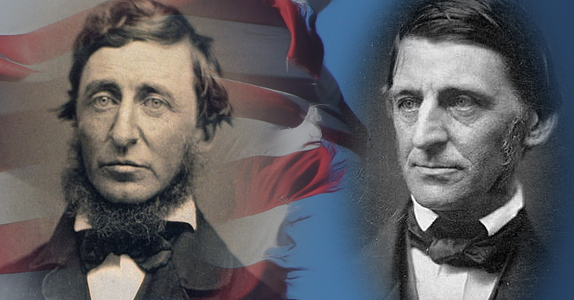
“What laws ever made men free?” Henry David Thoreau asks in The Night Thoreau Spent in Jail, a thoughtful new production at the Adobe Theater in Albuquerque. If his question has more than a passing resemblance to the rhetoric of the Tea Party 170 years later, the parallels deserve close examination.
I have published a detailed review of this brilliantly acted and skillfully directed play on talkinbroadway.com and won’t repeat that here, but I do want to discuss further the idea of freedom that is the core of this play—and of much of the political debate in the U.S. today.
Freedom is the attractive icon the Tea Party had adopted. It wants to return the United States to a supposed early 19th-century paradise of small government and individual liberty. But Thoreau lived in that era and found it wanting—too intrusive, too militarized, too unequal and too unfree, a government that taxed ordinary men to finance an unjust war and enforce slavery.
Thoreau chose to go to jail in 1845 rather than pay a $1 poll tax to support the Mexican-American War, an action that drives the plot of this play. Like a Teapartyer, Thoreau demands that the government stop telling him what to to do and allow him to be “a free man.” And like many a Teapartyer, he wants to be “a government of one.”
To stop the government from depriving people—Mexicans and Americans, blacks and whites, taxpayers and soldiers— of their freedom, he demands direct action, something his friend and mentor Ralph Waldo Emerson is reluctant to do. When Emerson asks Thoreau, “What are you doing in jail?” Thoreau shoots back, “What are you doing out of jail?”
The play sets up the two famous Massachusetts authors as foils and intellectual opponents, Emerson the slow-to-act wise man of many words, practical, pragmatic and ambivalent; and Thoreau, ideologue and idealist, rigid and rigorous, a man who’d rather act than talk, who relishes certitude and the moral high ground. Ultimately, the philosophical and personality differences drive a spear into the heart of their friendship.
In this play Thoreau despite his uncompromising rigidity, clearly gets the better of the argument, in part because the play was written during the Vietnam conflict when there was much discussion of withholding individual income taxes as a way to protest the war.
But while Emerson is a happily married father and a contented international celebrity, Thoreau is a lonely bachelor camping out by himself in a cabin beside Walden Pond. Then as now, it would seem, the personal and the political do not easily coexist.
I took two other messages, however, from this play. One is that the Tea Party’s world of a small government that left its citizens alone and, like a good physician, first does no harm, has been the vision of dreamers through the ages but never really existed, at least not in the United States.
The other message is that the anarchism of the left and the anachronism of the right are far closer than one might think, and in that maybe there is a gram of hope for our own divided society. For why can’t the Teapartyers and the humanists who are Thoreau’s descendants agree on making government stop supporting racism, economic and class divisions, war, invasion of privacy and assaults on personal freedom?
Over the decades and the centuries, government has done far more evil than good. It is government that makes the poor pay a higher percentage of their income in taxes than do the rich.
It is government that subsidizes vast commercial farms at the expense of family farms.
It is government that wastes trillions of dollars on unusable nuclear weapons.
It is government that keeps going to war and leaving the world in more of a mess after the war ends than when it began.
It was government that chose to bail out creditor banks rather than debtor homeowners when the real estate market crashed.
It was government that decided the Federal Reserve Board’s chef mission should be to protect creditors through low inflation rather than workers through full employment.
It was government that enforced the rights of slaveowners for more than two centuries and then enforced segregation for another century.
It was government that for a century used the army and police to protect capital against labor.
It is government that puts the best parks, the best roads, the best schools, the best of everything, including the purest air and the prettiest views, where the rich and powerful live and leaves the dregs for the rest of us.
It is government that licenses utilities and car manufacturers to alter the planet’s climate.
It would not be hard to make the case the Tea Party has wanted to make, but has been incapable of doing, that government, at least the government we have had in the United States for two centuries, is more foe than friend of its citizens and needs to be radically revised.
Democracy is supposed to be a method by which the majority can control their government. The simple truth, however, is that our government is, and has always been, controlled by the rich and the powerful. The relationship is one of servant and master, and no one should be surprised if the servant faithfully serves its master.
Is there a cure for the sickness of our democracy? In theory, yes. There is nothing in the Constitution to prevent the majority from using elections to seize control of the government. But that seems to have become almost impossible since the Supreme Court ruled that money is speech and therefore those with lots of money have every entitlement to lots of power.
The Night Thoreau Spent in Jail continues 7:30 p.m. Fridays-Saturdays and 2 p.m. Sundays through Feb. 1 at the Adobe Theater, 9813 4th St. NW in Albuquerque. An additional performance Thursday, Jan. 22 will be pay what you will. For reservations and information email .(JavaScript must be enabled to view this email address) or call 898-9222. I highly recommend it.
(Image of tattered flag derived from Beverly & Pack / CC)



Responses to “Play Illustrates Idealism vs Reality in American Corporatocracy”